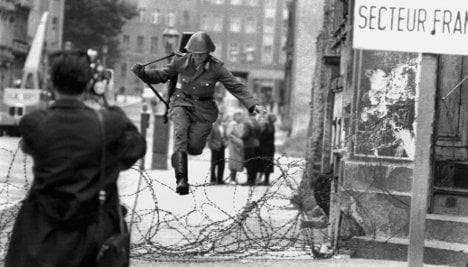I’ve never been to journalism school but if I had the professor – I can imagine him now, a corduroy jacket with leather patches – would surely have said: State your theme at the beginning and then stay focused!
But that is precisely my problem at the moment. I have a book deadline fast approaching and have taken some time off from my daily work for The Times. Though I resolve every day to produce a certain number of pages, I instead wake up early, walk the dog, drink a coffee at the bakers and read the papers. Then I find some other way to occupy my time.
Only by seven o’clock in the evening am I ready to write. In a quick sprint, a page is written, followed by a recovery period; then half a page, and exhaustion. It is probably the least efficient way of writing ever devised but the sheer accumulation of vacillation and guilt, the day of delay is so draining that I have to go out of the house to reward myself with a drink.
This isn’t difficult because Berlin is full of bars for late-night folk, and I don’t mean the dreadful bunkers used by clubbers or the overpriced “lounges” with velvet ropes out front. I’m talking about places with names like “Imma oof” and “Rudis,” where shift-workers go to get rid of their excess adrenaline.
At my regular haunts there are usually some journalists, maybe an emergency room doctor after a busy, bloody night, and perhaps a policeman on his way home. There are surprisingly few drunks and since everyone is trying to clear his head after a long day of complex problem-solving, discussion tends to be monosyllabic. Arguments flare up and fizzle out.
The other night, a reporter who should have known better launched into a passionate lament for the newspaper Neues Deutschland which looks as if it could collapse. Now if ever there was a paper that deserved to go bust it must surely be the ND, the former mouthpiece of East Germany’s communist party the SED. It has re-invented itself since the bad old days, but not by much; it is a paper with a history of calculated deceit. But I was too tired to make the obvious counter-arguments and just walked out.
The next day, meeting Vera Dörrier-Breitwieser, I wished I had not dodged a fight. She is a formidable woman and possesses a memory sharp enough to dismantle any nostalgic case for preserving a newspaper that once made excuses for a rotten regime. Her story is Berlin in aspic. Forget her, and people like her, and you distort the moral compass of the city.
She was 28 and living with her parents in the eastern district of Pankow when the Wall went up, training reluctantly as a teacher. Her father was a librarian, a member of the SED and a true believer. Her mother was a sceptic. What kept Vera sane were her regular weekend trips to a Christian-Jewish discussion group in Wannsee. The Wall put an end to that and she wrote to the institute expressing her sadness. They in turn set in motion the escape organisation of the Free University of Berlin.
A picture of Vera was sent to students in Switzerland who helped find a Swiss woman vaguely resembling the East Berlin student. They borrowed the woman’s passport and sent it to the FU team. And Vera began the process of reconstructing herself: with all the self-discipline of an athlete.
She memorised the birthdates of the Swiss woman’s children – they were entered in the passport and the East German border guards could well have asked her tricky questions. She even set about learning Swiss German, and changed her look to match the photo.
Out came the East German labels in the underwear, off came the East German boots. A western coat with seal fur was arranged; a hat that could be pulled down to disguise the height of her forehead. The rivers and villages surrounding her supposed birthplace in Switzerland were memorised; a backstory was created and committed to memory.
All this for a few minutes performance at the Friedrichstrasse crossing point. December 1961 she got over; the next woman to try to use a Swiss passport was caught and sent to the Stasi’s prison in Hohenschönhausen.
That short walk from east to west was probably the greatest moment in Vera’s life; a triumph of discipline, teamwork, of holding ones nerve. Not everything went smoothly later in West Berlin, but she found happiness in her work as a librarian at the Otto Suhr Institute.
Her life story, told to me over coffee without pathos, is proof that the Berliners have a great talent for escape. But it also reminded me that if you want to achieve something strongly enough, even the least promising of personalities can develop the appropriate psychological muscle, the habits of self-discipline.
So here’s my personal progress report: since meeting Vera, I have started to write in the mornings. Not much, and I am still easily distracted. But the pages are beginning to fill up, one by one.



 Please whitelist us to continue reading.
Please whitelist us to continue reading.
Member comments